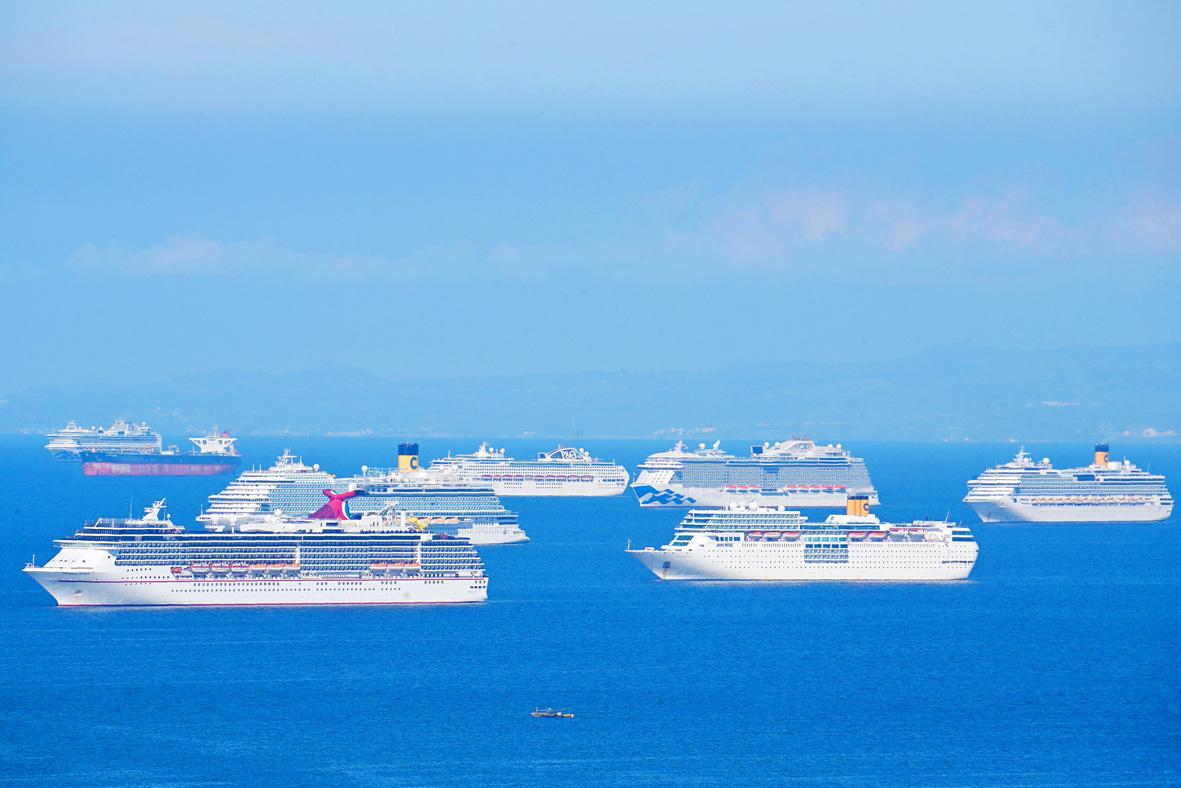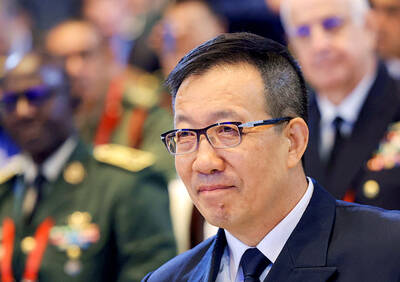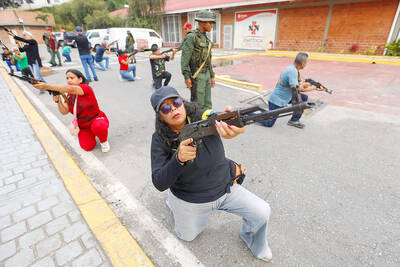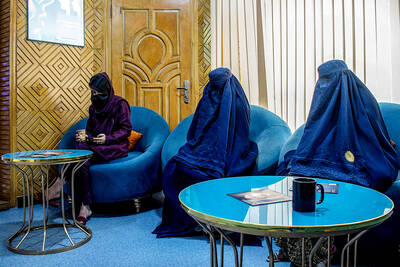Indian ship worker Tejasvi Duseja is desperate to go home after months stranded offshore by COVID-19 border closures and lockdowns that have left more than 200,000 seafarers in limbo.
From engineers on cargo ships to waiters on luxury cruise liners, ocean-based workers around the world have been caught up in what the UN warns is a growing humanitarian crisis that is to blame for several suicides.
Many have been trapped on vessels for months after their tours were supposed to end as travel restrictions disrupted normal crew rotations.

Photo: AFP
“Mentally, I am just done with it ... but I’m still holding up because I have no other option,” Duseja, 27, told via WhatsApp and Facebook Messenger late last month as the Indian-owned cargo vessel he works on floated near Malaysia.
Duseja, one of about 30,000 Indian workers unable to leave their ships, extended his seven-month contract a few months before the pandemic struck.
“The last time I stepped off from this 200 meter ship was in February,” he said.
Seafarers typically work for six to eight months at a stretch before disembarking and returning to their homes, with new crews taking their place.
However, as COVID-19 whipped around the world and paralyzed international travel, that was suddenly impossible.
Underscoring the growing urgency of the situation, more than a dozen countries at a UK-hosted International Maritime Summit this month vowed to recognize seafarers as “key workers” to help them get home.
Filipino luxury cruise ship technician Cherokee Capajo spent nearly four months on ships without setting foot on land due to the shutdowns.
The 31-year-old had barely heard of COVID-19 when he boarded the Carnival Ecstasy in Florida in late January. Soon, a number of Carnival-owned cruise ships were stricken with severe outbreaks — including the Diamond Princess in Japan.
After the Carnival Ecstasy passengers disembarked in Jacksonville, Florida, on March 14, Capajo and his colleagues were forced to stay on board for the next seven weeks.
Finally, on May 2, the ship sailed to the Bahamas where Capajo says he and 1,200 crew members were transferred to another boat that took them to Jakarta before arriving in the Philippines on June 29.
Capajo said he wanted to “kiss the ground” when he came ashore almost two weeks later, after finishing quarantine.
“This could probably be the hardest part of my experience as a seaman, because you are not sure what will happen every day,” Capajo said last week, as he endured a second quarantine near his hometown in the central Philippines.
“You worry if you’ll ever come back home, how long will you be stuck on the ship. It’s difficult. It’s really sad,” he said.
Filipinos account for about one-quarter of the world’s seafarers. About 80,000 of them are stranded because of the pandemic, Philippine authorities say.
The ordeal has taken a toll on the mental health of many seafarers, with reports of some taking their own lives.
In one case, a Filipino worker died of “apparent self-harm” on the cruise ship Scarlet Lady as it anchored off Florida in May, the US Coast Guard said.
Shipping industry groups have expressed their concerns about “suicide and self-harm” among workers in a joint letter to UN Secretary-General Antonio Guterres, who said last month some seafarers have been “marooned at sea for 15 months.”
An International Labour Organization (ILO) convention widely known as the “seafarers’ bill of rights” limits a worker’s single tour of duty to 12 months.
The strain is also being felt by families waiting at home. Priyamvada Basanth said she did not know when she would again see her husband who has been at sea for eight months on a ship owned by a Hong Kong company.
“The government is not even doing anything. I just want him to come home,” said Basanth in Kochi, India.
Lala Tolentino, who runs the Philippine office for a UK-based seafarers support group, said they had been swamped by “hundreds” of pleas for help from stranded workers since March.
“They want to know what will happen to them, where they are going. Will they be able to get off their ships,” she said.
Many of those stuck onboard completed their tours more than four months ago and were exhausted, the ILO said last month.
For Duseja, who comes from the northern Indian city of Dehradun, the end of his ordeal is in sight.
“I’m still on the ship, but mentally I am feeling slightly better because I’ve been told that I’m finally getting off the ship mid-August.” he wrote in a WhatsApp message last week.

BEIJING FORUM: ‘So-called freedom of navigation advocated by certain countries outside the region challenges the norms of international relations,’ the minister said Chinese Minister of National Defense Dong Jun (董軍) yesterday denounced “hegemonic logic and acts of bullying” during remarks at a Beijing forum that were full of thinly veiled references to the US. Organizers said that about 1,800 representatives from 100 countries, including political, military and academic leaders, were in Beijing for the Xiangshan Forum. The three-day event comes as China presents itself as a mediator of fraught global issues including the wars in Ukraine and Gaza. Addressing attendees at the opening ceremony, Dong warned of “new threats and challenges” now facing world peace. “While the themes of the times — peace and development —

Venezuela on Saturday organized a day of military training for civilians in response to the US deployment in the Caribbean, and amid new threats from US President Donald Trump. About a month ago, Washington deployed warships to international waters off Venezuela’s coast, backed by F-35 jets sent to Puerto Rico in what it calls an anti-drug and anti-terrorism operation. Venezuelan Minister of Defense Vladimir Padrino Lopez has accused Washington of waging “undeclared war” in the Caribbean, after US strikes killed over a dozen alleged drug traffickers off his country’s coast. Caracas also accused the US of seeking regime change, and

Decked out with fake crystal chandeliers and velvet sofas, cosmetic surgery clinics in Afghanistan’s capital are a world away from the austerity of Taliban rule, where Botox, lip filler and hair transplants reign. Despite the Taliban authorities’ strict theocratic rule, and prevailing conservatism and poverty in Afghanistan, the 20 or so clinics in Kabul have flourished since the end of decades of war in the country. Foreign doctors, especially from Turkey, travel to Kabul to train Afghans, who equally undertake internships in Istanbul, while equipment is imported from Asia or Europe. In the waiting rooms, the clientele is often well-off and includes men

BRIBERY ALLEGATIONS: A prosecutor said they considered the risk of Hak-ja Han tampering with evidence to be very high, which led them to seek the warrant South Korean prosecutors yesterday requested an arrest warrant for the leader of the Unification Church, Hak-ja Han, on allegations of bribery linked to the country’s former first lady and incitement to destroy evidence. The move came a day after the 82-year-old was questioned over her alleged role in bribing former first lady Kim Keon-hee and a lawmaker. Founded in 1954 by her late husband, Sun Myung Moon, the Unification Church has long been the subject of controversy and criticism, with its teachings centered on Moon’s role as the “second coming” and its mass weddings. Followers are derisively referred to as “Moonies.” However, the church’s